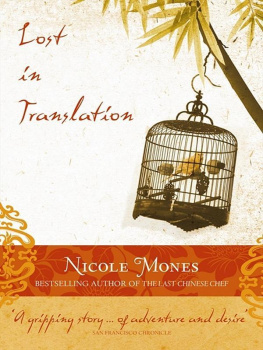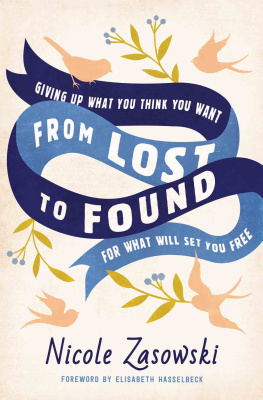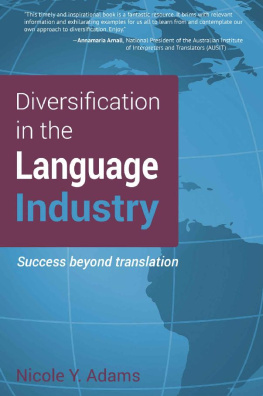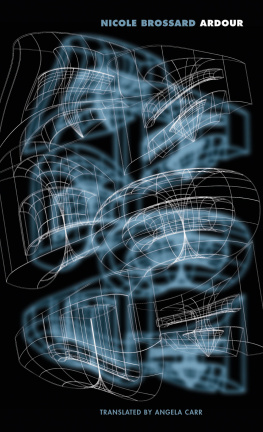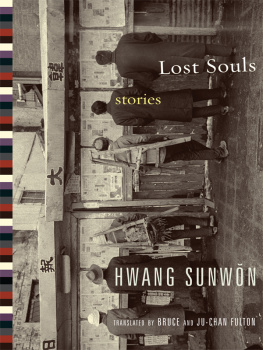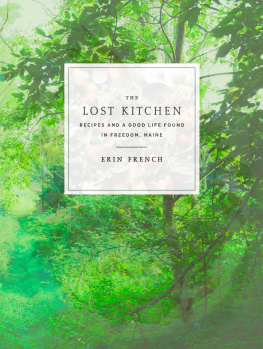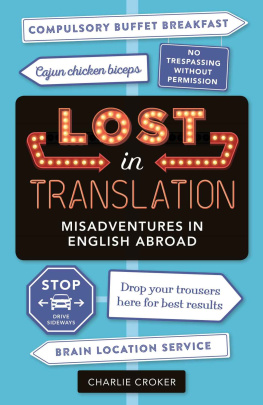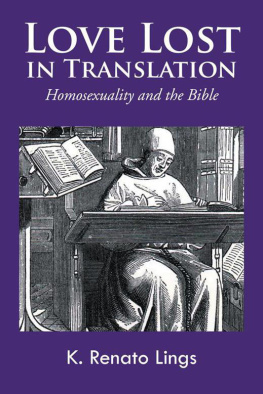Nicole Mones - Lost in Translation
Here you can read online Nicole Mones - Lost in Translation full text of the book (entire story) in english for free. Download pdf and epub, get meaning, cover and reviews about this ebook. year: 2009, publisher: HarperCollins Publishers Australia, genre: Art. Description of the work, (preface) as well as reviews are available. Best literature library LitArk.com created for fans of good reading and offers a wide selection of genres:
Romance novel
Science fiction
Adventure
Detective
Science
History
Home and family
Prose
Art
Politics
Computer
Non-fiction
Religion
Business
Children
Humor
Choose a favorite category and find really read worthwhile books. Enjoy immersion in the world of imagination, feel the emotions of the characters or learn something new for yourself, make an fascinating discovery.
- Book:Lost in Translation
- Author:
- Publisher:HarperCollins Publishers Australia
- Genre:
- Year:2009
- Rating:5 / 5
- Favourites:Add to favourites
- Your mark:
- 100
- 1
- 2
- 3
- 4
- 5
Lost in Translation: summary, description and annotation
We offer to read an annotation, description, summary or preface (depends on what the author of the book "Lost in Translation" wrote himself). If you haven't found the necessary information about the book — write in the comments, we will try to find it.
Lost in Translation — read online for free the complete book (whole text) full work
Below is the text of the book, divided by pages. System saving the place of the last page read, allows you to conveniently read the book "Lost in Translation" online for free, without having to search again every time where you left off. Put a bookmark, and you can go to the page where you finished reading at any time.
Font size:
Interval:
Bookmark:

Table of Contents
PRAISE FOR LOST IN TRANSLATION
"A complex portrait of a woman in search of
herself, played out against the exotic background of some of
Chinas remotest regions... Mones succeeds in integrating
archeological history, spiritual philosophy and cultural dislocation
into a tale of identity on many levels....
Brings fresh insight into the nuances of Chinese culture."
Publishers Weekly
"A sensitive and affecting first novel... The novels layered
motif of personal and historical discovery, adroitly interwoven,
provides both a gripping story and an intimate glimpse of a
society undergoing profound change.... Mones flair for
startling descriptions, her gift for narrative and her insight into
character and culture... make compelling reading."
San Francisco Chronicle
"An enthralling, sensuous journey through China that leads deep
into the hidden chambers of the human heart."
Beth Henley, Pulitzer Prize-winning author of Crimes of the Heart
"An absorbing, fine first novel."
Newsday
"A striking debut... A sensuous and adventurous story."
Glamour
"An adventurous and romantic tale... a remarkable first novel."
Dominick Dunne, bestselling author of Another City, Not My Own
"The author of this first novel has herself spent considerable time
in China, and she conveys with poignant elan the trance of
unrequited love for the exotic."
The New Yorker
Please turn the page for more extraordinary acclaim....
"A strongly affecting story... an enthralling, subtly nuanced portrait of the cultures, landscapes, and people of China."
The Christian Science Monitor
"Impeccable descriptions and perfect dialogue."
Mademoiselle
"Mones succeeds brilliantly in portraying daily life in China; she does a fine job too in recounting the countrys ancient history."
People
"An absorbing, richly imagined, and intelligent debut."
Kirkus Reviews
"Her descriptions of Chinese customs, her insights into the
distinctive character, her sense of nuance, all have the
unmistakable ring of authenticity."
Eugene (Oreg.) Register-Guard
"[An] ambitious debut novel... authoritative in its description of modern China."
BookPage
"A pleasurable, observant and exciting paean for China...
Mones greatest achievement in this novel is
her rendering of the tiny cultural nuances."
The Seattle Times
Authors Note
This is a work of fiction. It includes references to real people and events, which are used to give the fiction a historical reality. In particular, although many of the facts concerning Teilhard de Chardin and Lucile Swan are accurate and the quotations from their letters come directly from published sources, their lives are used fictitiously in this work. Names, characters, and incidents relating to nonhistorical figures are the product of the authors imagination. Please see the Historical Note for more information.
Material from the following sources has been reprinted by permission:
The Phenomenon of Man, by Pierre Teilhard de Chardin. Copyright 1955 by Editions de Seuil. Copyright 1959 in the English translation by William Collins Sons & Co. Ltd., London, and Harper and Row, Publishers, Inc., New York. Reprinted by permission of HarperCollins Publishers, Inc.
The Phenomenon of Man, by Pierre Teilhard de Chardin. Editions de Seuil, 1951. Reprinted by permission.
"As the sun rose over the mountain..." reprinted by permission of Philomel Books from Chinese Mother Goose Rhymes, selected and edited by Robert Wyndham, 1968 by Robert Wyndham. Brief segments have also been quoted from the following works:
Letters From a Traveller, by Pierre Teilhard de Chardin, Copyright 1962 in the English translation by William Collins Sons & Co. Ltd., London, and Harper and Row, Publishers, Inc., New York.
Letters to Lontine Zanta, by Pierre Teilhard de Chardin in the English translation by William Collins Sons & Co. Ltd., London, and Harper and Row, Publishers, Inc., New York, 1969.
The Letters of Teilhard de Chardin and Lucile Swan, Thomas M. King and Mary Wood Gilbert, editors. Copyright 1993 by Mary Wood Gilbert.

Since the inner face of the world is manifest deep within our human consciousness, and there reflects upon itself, it would seem that we have only got to look at ourselves in order to understand the dynamic relationships existing between the within and the without of things at a given point in the universe.
In fact so to do is one of the most difficult of all things.
Pierre Teilhard de Chardin The Phenomenon of Man
In the lobby of the Minzu Hotel, Second Night Clerk Huang glanced out through the great glass doors just as the foreign interpreter wheeled her bicycle past. He stared, fascinated. He knew what it meant when she left, late at night, wearing a short skirt. There were no secrets in China. He smiled and turned back to his computer.
Outside, Alice Mannegan pedaled down Changan Dajie. She flew past the cobbled sidewalks, the storefronts crowded with Chinese paizi, signboards in arty, propulsive italic characters: Happy Fortune and Flying Crane and Propitious Wind. Knives and shoes and beauty supplies, bicycle parts and baling wire, all screaming for attention.
But their metal shutters had clanged down for the night. The black-headed crowd was gone. In daytime the boulevard throbbed with renao life, but now the bubbling volcano of Pekingese and frantically jingling bike bells was silent. It still smelled like Beijing, though. The air was ripe, opulent, sewerishand thick with history.
Beyond the low row of storefronts she glimpsed the squat, massive official buildingsthe institutes and bureaus and administrations which lined the boulevard. Changan was the main spoke of Beijings wheel. Broad and straight, built for parades, it roared right to the heart of the capital, and of all China, the Forbidden City. The Danei, people used to call it. The Great Within. And now there it was: the massive ocher bulwarks, the medieval walls, closed, faceless; all qi pointing inward, to what was concealed, powerful, and endlessly complex. Its entrance was crowned with the huge red-cheeked portrait of Chairman Mao, smiling down from atop the Gate of Heavenly Peace.
Alice turned, skirting Tiananmen Square. A breeze rustled leaves above her head and sent an empty fast-food container skipping across the pavement. She glanced right and left at the sound. No one.
She pedaled harder, the summer night wind silky on her face. Past the great stone Qianmen arch, then south on Qianmen Boulevard into the old Chinese City with its riot of shops, restaurants, theaters. She veered off the boulevard, through the tangle of narrow hutongs. She loved this ancient maze of dirt-packed lanes. To her this was the true heart of the capital, not the colossal high-walled palace behind her. Here in the gracefully repeating pattern of silvery stone walls and tile roofs, Alice sometimes felt China in her grasp. Sometimes. She turned again, right, then left. Now she crossed the familiar intersection, with the old capped-over stone well in the center. She steered into a brick-paved, stone-walled alley so narrow, her bicycle could barely pass. There. The Brilliant Coffee.
The neon sign screamed COFFEE in English, English being very fashionable in Beijing just now, but of course coffee had very little to do with the purposes of this establishment. She chained her bike to the crowded metal rack. There was one door, painted black, and a row of windows sealed over to make the place appear closed. There were no signs of life. But it was Friday night, almost midnight, and Alice knew better.
Next pageFont size:
Interval:
Bookmark:
Similar books «Lost in Translation»
Look at similar books to Lost in Translation. We have selected literature similar in name and meaning in the hope of providing readers with more options to find new, interesting, not yet read works.
Discussion, reviews of the book Lost in Translation and just readers' own opinions. Leave your comments, write what you think about the work, its meaning or the main characters. Specify what exactly you liked and what you didn't like, and why you think so.

